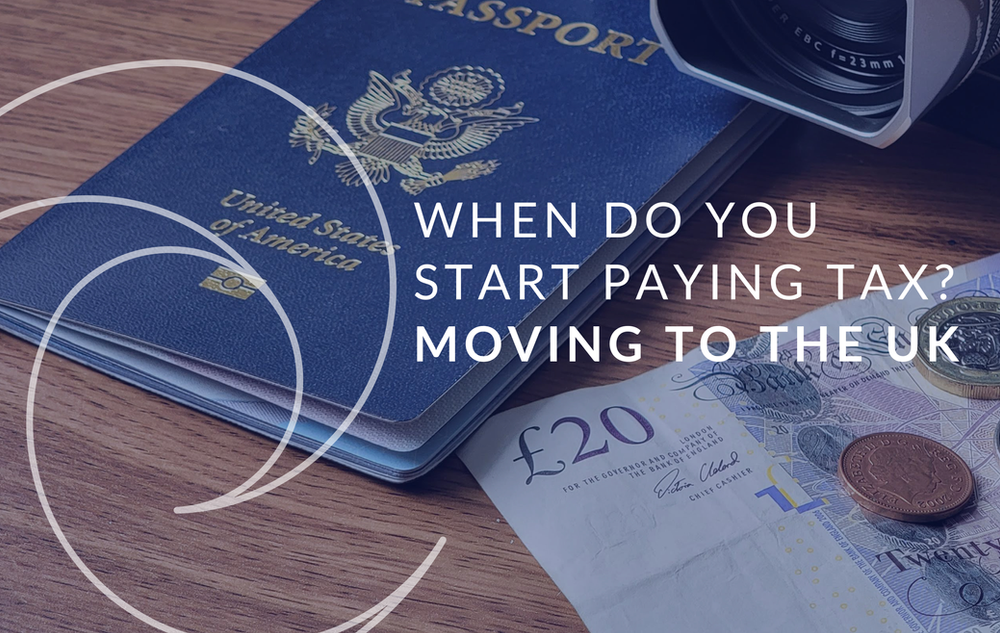When do you pay tax when moving to the UK? Well, not only is it important, but it’s also extremely useful to be aware of your tax responsibilities and the allowances available to you in the UK and your home country. In this article, we briefly overview the rules about when do you pay tax when moving to the UK.

The UK Statutory Residence Test – The Three Types
This is where it all starts – identifying whether or not you can become a UK tax resident. It’s determined by what’s called the Statutory Residence Test.
The UK statutory residence test has three parts:
- The automatic overseas residence tests
- The automatic UK residence tests
- The sufficient ties tests
If you meet any of the automatic UK resident tests, or are resident in accordance with the sufficient ties, the default position is that you are resident for the whole tax year.
What are the automatic UK resident tests?
They look at a combination of physical presence and relevant connections to the UK to determine whether you are considered to be a UK resident.
Split Year Tax Treatment (of your Split Year Provisions)
It’s important to bear in mind the UK tax year (running Apr – Apr). In specific circumstances, when you arrive in the UK, you are allowed to divide the UK tax year in which you arrive into two parts.
A. The part before arrival (non-resident) and;
B. The part following your arrival (resident)
These are known as the ‘split year provisions’. They are for those who are arriving in the UK, who are starting to have a home in the UK, starting a full time job in the UK or returning to the UK from working full time overseas.
Non-residents are only taxed on specific types of UK-source income. Sometimes non-residents are taxed on UK-source capital gains, whereas UK residents are potentially taxable on their worldwide income and their capital gains too.
What is Domiciled in the UK?
The extent to which you are required to pay UK tax on income and gains generated outside the UK, entirely depends on what is termed your ‘domicile status’. The concept of domicile is essentially where you consider your permanent or indefinite home to be. This can be:
The country of your birth, or;
Where your father considered his permanent or indefinite home to be during your childhood or;
Somewhere that you build a life and consider home as an adult
Domicile and Remittance Basis
If your domicile (the place you consider your permanent home) is not in the UK, then you can potentially claim the remittance basis. Claiming the remittance basis allows you to only pay tax on non-UK income and capital gains, to the extent that it is considered to be “remitted” (ergo received into) to the UK. The remittance basis can be claimed or not claimed each year, that’s your choice and dependent on your preferences and circumstances. It’s important to note that the annual cost of claiming the remittance basis increases, alongside the length of your residence in the UK.
- < 7 years residence of previous 9 – loss of income tax allowance and capital gains tax exemption
- 7 years of residence of previous 9 – loss of income tax allowance and capital gains tax exemption, +plus flat fee of £30,000
- 12 years of residence out of the previous 14 year – loss of income tax allowance and capital gains tax exemption plus flat fee of £60,000
- After 15 years of residence in the previous 20 years, the remittance basis can no longer be claimed
For non-UK domiciled individuals (i.e. those who don’t consider UK as their permanent home), the first three years of residence in the UK (including the year of arrival), can also bring an entitlement to tax relief. This tax relief is based on any proportion of salary which relates to the number of days spent working outside the UK. This first three years tax relief also depends on conditions being met, as to where the salary is paid and retaining an appropriate proportion of the salary outside the UK.
Monies that you had before becoming resident in the UK would be considered tax free. Therefore, to benefit from this and any claim to the remittance basis, it is important to structure your bank account properly. This is something a specialist can help you with.
Finally, it’s important to know that there is no uplift to market value on arrival in the UK in terms of the basis for assets for UK CGT purposes, if that asset is sold whilst you’re a UK-resident. The entire difference between the original purchase price and sale process would potentially be subject to tax.
If you have any specific questions about your tax responsibilities, we can answer those for you based on your specific circumstances. We can also work with you on an on-going basis to help you to always prepare well in advance.
Here are some further useful, reputable UK tax resources for you:
